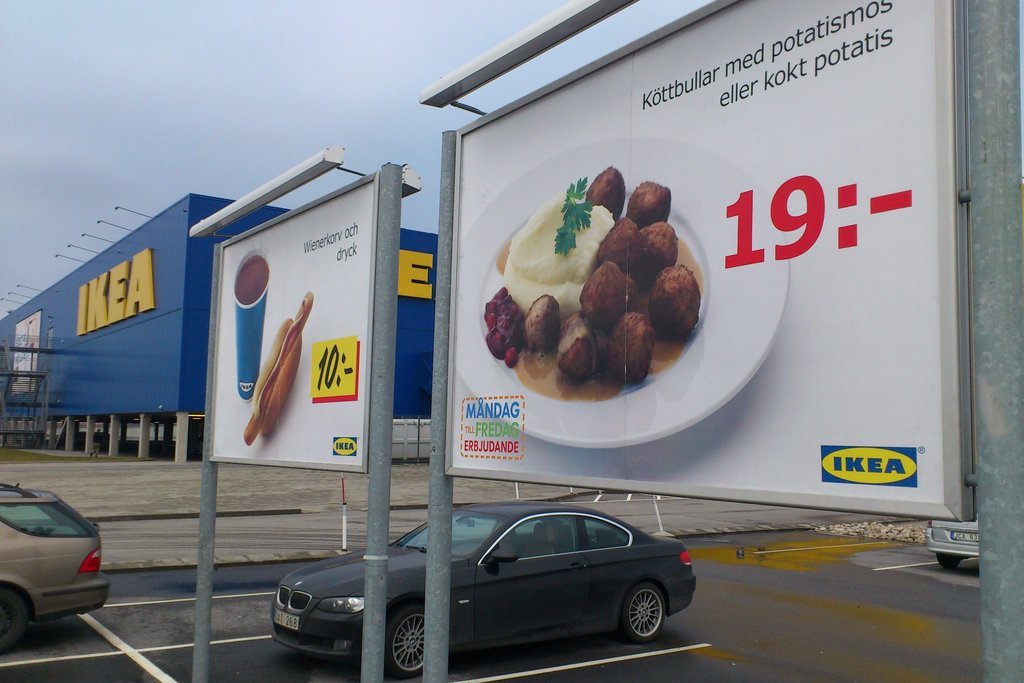|
LONDON — Seeking literary echoes of current predicaments, Britons can generally rely on Shakespeare. But one line in the national memory has proved curiously inappropriate.
伦敦——英国人通常可以借助莎士比亚,为当前的困境找到相应的文学描写。但是很奇怪,英国人有句耳熟能详的台词,用在今天却偏偏很不恰当。
“A horse, a horse, my kingdom for a horse,” cries Richard III, facing defeat at the Battle of Bosworth Field, in 1485. Yet horses seem to be the last thing Britons want these days, at least in food that is labeled as something else altogether.
1485年,在博斯沃斯平原的战场上,即将战败的理查三世(Richard III)喊道,“一匹马,一匹马,我的王国换一匹马!”但现在,似乎英国人最不想要的就是马,至少不想在标明了是别的肉类的食品里面吃出马肉。

瑞典的一幅广告海报
For weeks, the land has been seized with a spreading, Europe-wide scandal over discoveries of equine DNA in processed meals sold under household brands packaged as exclusively bovine — spaghetti Bolognese, lasagna and burgers among them. Television documentaries have investigated the phenomenon. Headlines have trumpeted it. Bloggers have blogged. Tweeters have tweeted.
几周来,英国密切关注一场波及全欧洲的丑闻:一些家喻户晓的品牌出售的肉类加工品,包装上写着纯牛肉,却检测出了马的DNA。这些食品中包括波隆那意大利面、千层面和汉堡包。电视纪录片对此展开了调查,报纸头条大肆宣扬此事,博客作者为此撰文,Twitter用户纷纷转发这条消息。
But no one seems able to fully answer the question of why shoppers and diners in Britain are so much more worried about a hint of horse meat than European neighbors in France, the Netherlands and elsewhere who eat their steeds with equanimity.
但似乎无人能够解释清楚,为何食物中出现一点点马肉,英国的消费者和食客就如此担忧,而他们的邻居,法国、荷兰等其他欧洲国家民众都能心平气和地吃马肉呢?
Soul-searching Britons have invoked factors ranging from an age-old taboo on consuming animals seen as pets, companions or heroes of sport and war, to a sense of one more betrayal in a catalog of broken public trust.
善于反思的英国人挖掘了一系列原因。例如,根据英国古老的禁忌,不可食用被人类视为宠物、伙伴、及体育和战争英雄的动物。又例如,此事是诸多欺骗公众行为的又一个案例。
“This is not a horse meat scandal,” said the Rev. Alexander Lucie-Smith, a priest writing in The Catholic Herald. “It is a labeling scandal” that has prompted the question, “Can we trust anything we read on a label?”
亚历山大·路西·史密斯(Alexander Lucie-Smith)牧师在《天主教先驱报》(The Catholic Herald)上撰文称,“这不是马肉丑闻,这是商品标签丑闻”,此事令人质疑,“我们还能相信商品标签上的任何信息吗?”
Part of the answer lies in recent memory of mad cow and foot-and-mouth disease that shook confidence in the nation’s herds. An academic study even traces the equine aversion to the eighth century, when Pope Gregory III sought to press newly Christianized Anglo-Saxons to abandon their horse-eating, pagan ways.
近期的疯牛病和口蹄疫动摇了人们对英国畜群的信心。对这两种疫病的记忆,可以部分地回答这个问题。一项学术研究甚至将厌食马肉的传统追溯到八世纪。当时,教皇格里高利三世(Pope Gregory III)试图迫使新皈依的盎格鲁-撒克逊人摈弃吃马肉这种异教习俗。
For some, the brouhaha reflects unease among consumers who feel double-duped, pressed by economic austerity into buying cheap, ready-made meals while the food chain delivering them is manipulated by shadowy, get-rich-quick suppliers, perhaps even criminal gangs. The scandal, moreover, has conjured Britain’s stubborn class distinctions, with those who can afford pricey butchers’ cuts sneering at the masses who cannot.
此番的喧嚣也反映了一些消费者的不安。他们认为自己遭受了双重愚弄。由于经济紧缩,他们被迫购买便宜的成品食物。然而,出售这些食品的连锁企业,却又被那些追求暴富、偷偷摸摸的供应商,甚至是犯罪团伙操纵。而且,该丑闻也令人想起英国根深蒂固的等级差异。富人买得起屠户手中昂贵的鲜切肉。他们嘲笑买不起鲜肉的大众。
Horse meat is much cheaper than beef, and investigators have discovered a murky, often unregulated procession of players stretching from Romania to Mexico, with no clear indication of the point at which it enters the mix of meat sold as beef, exploiting an age-old hankering for Britain’s signature hearty food.
马肉比牛肉便宜得多。而且,调查还发现了一条缺乏监管的地下产业链,一直延伸到罗马尼亚和墨西哥,根本不知道是在哪个环节把马肉混入了牛肉制品,英国人悠久的喜爱牛肉的传统被利用了。
As long ago as the 15th century, the Constable of France — according, yes, to Shakespeare, this time in “Henry V” — analyzed the English character thus: “Give them great meals of beef and iron and steel, they will eat like wolves and fight like devils.”
早在15世纪,法国骑兵统帅就这样分析英国人:“给他们一顿牛肉大餐和钢铁,他们就会像狼一样大吃,像魔鬼一样战斗。”是的,这句话也出自莎士比亚,这次是《亨利五世》(Henry V)。
Not for nothing did the British earn the French sobriquet “les rosbifs,” betokening an overwhelmingly sniffy Gallic perception of British cuisine.
法国人戏称英国人为“烧牛肉”(les rosbifs),这不是没有道理的,这也表现出法国人对英国饮食完全嗤之以鼻的态度。
The French, it is said, found their own dietary vindication at the Battle of Eylau, in 1807, when, possibly apocryphally, Baron Dominique-Jean Larrey, the surgeon general of Napoleon’s Grande Armée, ordered starving French troops to eat the flesh of their fallen horses, enshrining the practice of equine epicureanism.
据说,法国人是在1807年埃劳战役(Battle of Eylau)中为自己的饮食习惯找到了依据。这有可能只是传说,但据说当时拿破仑大军的军医长多米尼克-让·拉雷男爵(Baron Dominique-Jean Larrey)下令饥饿的士兵吃战死的马肉,让爱吃马肉成了法国人的神圣传统。
To this day, in an area of Paris that I frequent, the horse-butcher takes her place proudly at the twice-weekly street market alongside vendors of fresh seafood, ripe Brie, roast chicken, foie gras, p^até and fare like Andouillette sausage made of porcine entrails, which seems as alien to some palates as horse meat does to the British.
直到今天,在巴黎一个我经常去的地方,一家卖马肉的屠户还在一周两次的街边集市上骄傲地摆摊营业,她旁边有卖海鲜、熟布里奶酪、烤鸡、鹅肝酱还有用剁碎的猪肠做馅的法国香肠的摊位。用猪下水做香肠,这对一些人来说恐怕就像马肉对英国人一样地奇怪。
In other words, food defines identity. As a German professor, Victor B. Meyer-Rochow, told Radio Free Europe, “by saying the horse is such a noble animal and we will not eat this meat, we elevate ourselves above those who treat the horse as if it were just rabbit or something else.”
换句话说,饮食决定了身份。就像德国教授维克托·B·迈尔-罗霍(Victor B. Meyer-Rochow)在自由欧洲电台(Radio Free Europe)上说的那样,“我们说马是这样一种高贵的动物,所以不能吃马肉,这样,我们就抬高了自己,让我们显得比那些吃马肉像吃兔肉一样的人要优越。”
But there is a much more somber message. In recent years, an unrelenting succession of tawdry scandals has eroded trust in the British press and the BBC, the National Health Service, Parliament and individual politicians. Exposés of the rigging of benchmark interest rates and the mis-selling of financial instruments have compounded the loss of confidence in banks and bankers since the financial crisis of 2008.
然而,这件事还传递出一个更加灰暗的信息。最近年,关于英国媒体、BBC、国家医疗服务体系(National Health Service)、议会以及政客个人的丑闻不断被曝光。操控基准利率和不当销售金融工具的丑闻曝光更是加剧了2008年金融危机以来人们对银行和银行家的信任危机。
Indeed, the former editor Andreas Whittam Smith wrote in The Independent, “The more closely the horse meat scandal is examined, the more it brings to mind the origins of the banking crisis” — for horse meat sold as beef, read subprime mortgages sold as safe investments.
的确,《独立报》(The Independent)前任编辑安德烈亚斯·惠特曼·史密斯(Andreas Whittam Smith)曾在该报上称,“越深入地审视马肉丑闻,就越让人联想到银行业危机的根源”——挂着牛头卖马肉,不正像打着安全投资的幌子,推销次级抵押贷款一样吗?
Perhaps what really distinguishes the British, though, has been a crop of horsey and not very funny jokes, suggesting a stoic resignation to yet one more scam that will go unexplained and unpunished, leaving ordinary people little choice but to look for a Monty Pythonesque bright side, and mull the old adage: caveat emptor, let the buyer beware.
或许,真正显示了英国人特点的,是一连串与马有关的冷笑话,说明英国人面对又一次的欺诈行为,还是只能由它去,诈骗得不到解释,也得不到惩罚,普通人基本没有选择,只能阿Q式地自我宽慰,想想那句老话:商品售出,概不负责,买方留心。
A sample — and this is one of the better ones: A burger walks into a bar and asks for a drink. “I can’t hear you,” says the barkeep. “Sorry,” replies the burger. “I’m a little bit horse.”
其中一个比较好玩的笑话是这样的:一个汉堡包走进酒吧点杯喝的。侍者说,“我听不清楚。”汉堡包回答道,“对不起,我嗓子有点哑。”(英文“沙哑”[hoarse]与“马”同音——译注)
翻译:梁英、张亮亮
|
- VOA 英语教学节目
-
- 经典英语在线训练资源
-
|

